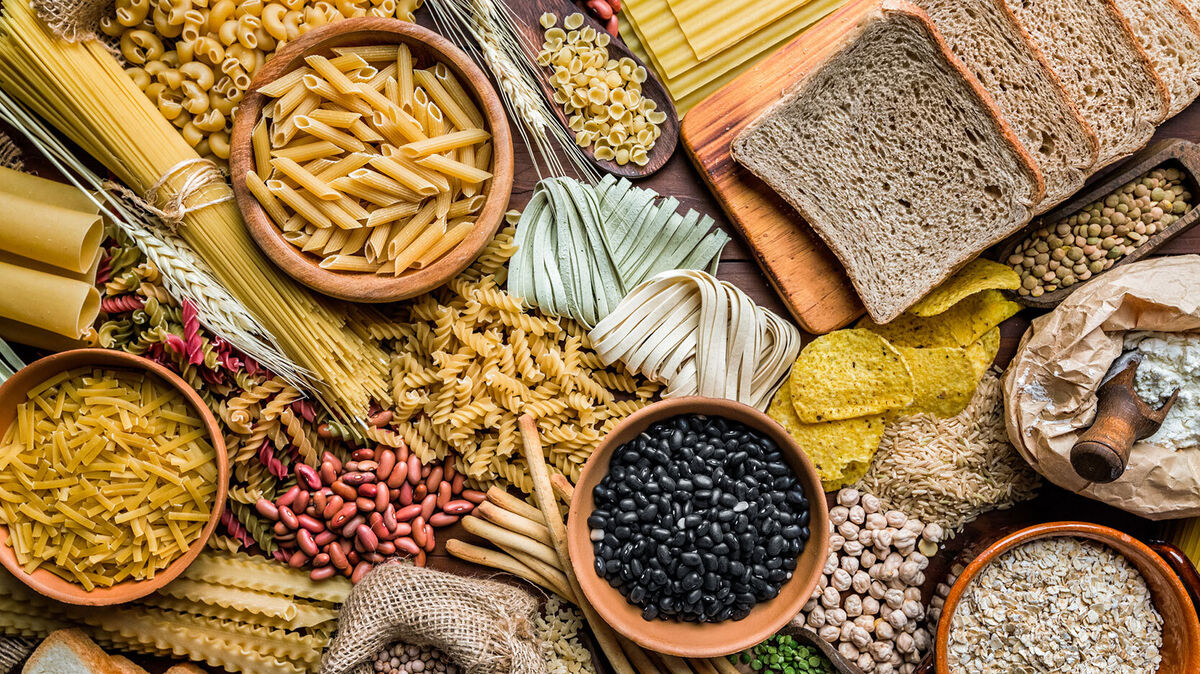
A carbohydrate is an organic compound that takes the forms of sugars, starches and fibers in living tissues and food. The energy created while carbohydrates (also known as "carbs") break down during digestion becomes energy your body can use. However, some types of carbohydrates function by providing a limited amount of energy, while other carbohydrates keep you energized for a longer period of time. Keep reading for examples of carbohydrates and where you might find them in your daily diet.
Simple Carbohydrates
The best way to define carbohydrates is that they are strands of sugars that the body breaks down to create energy. Simple carbohydrates are short strands, while complex carbohydrates are long strands. Simple carbohydrates are broken down quickly by the body, making them good sources of quick energy but poor sources of long-term energy.
Examples of Simple Carbohydrates
The two types of simple carbohydrates are monosaccharides (made up of one sugar) and disaccharides (made up of two sugars). They are the building blocks for complex carbohydrates.
Monosaccharide carbohydrates examples and where they're found include:
- arabinose - coffee, wine, vegetables
- allulose - raisins, figs, dried fruits
- fructose - fruit, honey, agave syrup
- galactose - butter, cream, ghee
- glucosamine - shellfish, animal cartilage
- glucose - molasses, sweet corn, fruit juices
- mannose - cranberries, broccoli, green beans
- N-acetylgalactosamine - watermelon, mulberry, Ceylon cinnamon
- ribose - eggs, beef, poultry
- rhamnose - oranges, carrots, cabbage
- xylose - potatoes, bread, peas
Examples of disaccharides include:
- cellobiose - honey, pine needles, corn
- isomaltose - processed foods, condiments, sugar substitutes
- lactose - milk, yogurt, ice cream
- maltose - bread, cereal, peaches
- rutinose - plums, cherries, grapefruit
- rutinulose - lentils, whole grains, brown rice
- sucrose - maple syrup, sugar cane, candy
- trehalose - sunflower seeds, mushrooms, yeast
These sugars are part of a healthy diet. However, when simple carbohydrates are processed into highly concentrated forms, such as high fructose corn syrup (found in sodas, fruit snacks and candy), they can lead to unhealthy eating habits and nutrition.
Complex Carbohydrates
Complex carbohydrates consist of several simple sugars. They consist of oligosaccharides (which have three to ten sugars) and polysaccharides (which have more sugars than oligosaccharides). While simple carbohydrates are mainly types of sugars, complex carbohydrates include starches and fibers, which are slower to digest and more nutritious.
Examples of Complex Carbohydrates
You'll find complex carbohydrates, known as starches and fiber, in foods that you eat every day. Starches are rich in vitamins and minerals and are often added to other foods as thickeners. Fiber cannot be digested by the body, but aids in the digestive process and can lower your cholesterol. Complex carbohydrates are typically found in plant cell walls.
Oligosaccharide carbohydrates examples include:
- dextrin - wheat, corn, potatoes
- fructooligosaccharides (FOS) - onion, artichokes, chicory
- galactooligosaccharides (GOS) - garbanzo beans, cashews, soybean
- gentianose - root vegetables, spices
- isomaltooligosaccharide (IMO) - soy sauce, sourdough bread, kimchi
- maltotriose - shiitake mushrooms, Chinese cinnamon, baked goods
- mannan oligosaccharides (MOS) - coffee beans, yeast, probiotics
- raffinose - Brussels sprouts, cabbage, whole grains
- xylobiose - almonds, bran, bamboo
Polysaccharide carbohydrates include:
- amylopectin - long-grain rice, potatoes, corn
- amylose - barley, wheat, potatoes
- arabinoxylan - rye, oats, flaxseed
- beta-glucan - oats, seaweed, barley fiber
- carrageenan - cottage cheese, almond milk, coconut milk
- cellulose - roots, apple skins, bran
- chitin - lobster, shrimp, insects
- fructan - wheat, onions, spelt
- glycogen - pasta, quinoa, legumes
- hemicellulose - green beans, wheat
- inulin - garlic, asparagus, bananas
- nigerose - rice, rice wine
- pectin - strawberries, guavas, citrus fruits
- psyllium - seeds, plant husks
- xanthan gum - soups, syrups, sauces
Starches are part of an essential part of a healthy diet along with foods that have high amounts of fiber. If you include several of the foods on each of these lists into your daily meals, you'll be positively contributing to your nutritional and digestive health.
Balancing a Healthy Lifestyle With Carbs
Knowing the type of carbohydrate in the foods you eat can improve your energy levels and your nutrition. Like all aspects of your health, balance is key — you need both simple and complex carbohydrates in your diet to maintain that balance. Learn more about what your body needs with these examples of monounsaturated fats and their potential benefits. Once you have a plan for your nutrition, check out 15 personal health goal examples that you can reach.